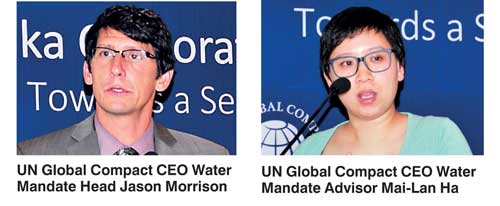Tuesday Feb 24, 2026
Tuesday Feb 24, 2026
Wednesday, 25 May 2016 00:00 - - {{hitsCtrl.values.hits}}
By Hiruni Dabarera
In the backdrop of accelerated global warming and drastic seasonal variations, the United Nations Global Compact held a CEO Water Mandate with the Sri Lankan private sector yesterday in a bid to introduce emerging corporate water stewardship practices and how it can help the achievement of the sustainable development goal on water and sanitation.
The private sector representatives who were present at the workshop shared the problems in their corporations in relation to water usage and management with the Head of the United Nations Global Compact (UNGC) CEO Water Mandate, Jason Morrison and Advisor to UNGC CEO Water Mandate, Mai-Lan Ha. Accordingly, the UNGC representatives concluded how the main problems Sri Lanka face is not in relation to water scarcity but the lack of proper water management, planning, infrastructure management and funding.
Speaking to the Daily FT Jason Morrison expressed how they are hoping to work collaboratively with local networks of the Global Compact to apply best practices in water among the business community. “Our work here in Sri Lanka during this brief visit will be defined by the local members. Yes, there are identified water challenges in the business community but the question that still remains is whether there is appreciative value with the CEO Water Mandate Partnering with local networksto try bring solutions and if so what do those look like,” Morrison further elaborated. According to him they are willing to help the Sri Lankan business community only if there is a sense of that being valuable.
Morrison further went onto to note how in other countries in the South Asian region like India or Bangladesh problems in relation to water management were more acute. Specifically, in India, the work executed by the CEO Water Mandate was more recognised by the business community according to him. He also commended the innovative initiatives undertaken in Bangladesh to arrive at water stewardship practices in the apparel sector and textile-manufacturing sector working with the likes of International Finance Corporation (IFC) and a number of other NGOs. He asserted that it’s not necessarily country-wise but sector specific within those countries.
The CEO Water Mandate is a special initiative of the UN Secretary General and the UNGC, implemented in partnership with the Pacific Institute in 2007. The Mandate was created out of the acknowledgement that global water challenges create risk for a wide range of industry sectors, the public sector, local communities, and ecosystems alike.
“Often times the role that we play is trying to connect the business community with other stakeholders that share an interest on water stewardship and may want to be a co-investor in solutions in terms of infrastructure, source-water protection or replenishing projects. There are companies like Coca-Cola that are taking measures to invest in protecting source-waters and also other agencies like UN Development Program or UNICEF that may want to co-invest in projects that are based on water stewardship,” Morrison concluded.
Pix by Bhanuka Kirinde